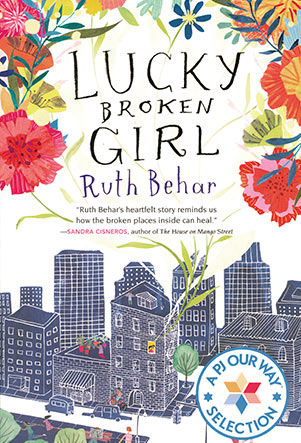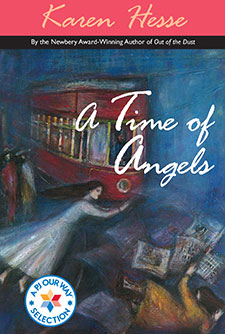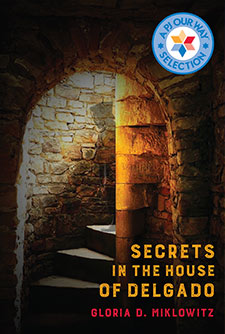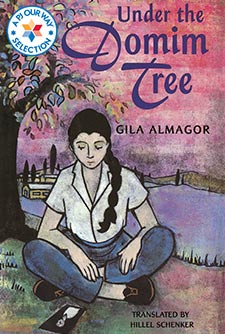Lucky Broken Girl
When Ruthie moves to New York from Cuba the other kids think she’s not smart because she doesn’t know much English. Just when she starts to fit in, she gets into a bad accident. People say she’s lucky to be alive, but being stuck in a body cast for a year sure doesn’t feel lucky!
Average Rating
( hint: Login to leave a review! )
162 Reviews
Leave Review
What the Book Is About
Jewish Content & Values
Positive Role Models
Content Advisory
Talk It Over
More for You
What the Book Is About
10-year-old Ruthie and her family are Jewish-Cuban immigrants who move to the United States when Castro comes to power. Soon afterwards, a car accident leaves Ruthie in a body cast for a year. Ruthie’s fears that she will never walk again, her good friend’s awkwardness with her illness, and Ruthie’s struggles to keep her own spirits up add depth and complexity to this beautifully written book, which is based on the author’s childhood and gives a fascinating glimpse into the world of Jewish-Cuban immigrant life in 1960s New York.
Jewish Content & Values
- Ruthie’s Jewish-Cuban family is Jewishly diverse, with a Polish Bubba and Zeide and Ladino-speaking grandparents who were originally from Turkey and Spain. Ruthie’s friend Danielle’s mother immigrated to the United States from Belgium but is originally from Morocco and speaks English, French, and Arabic.
- The family observes some Jewish festivals and rituals: there are references to challah, matzo, and avoiding pork.
- Ruthie is a spiritual and introspective character and prays to “the God of her forefathers.”
- When Ruthie is bedridden for a year, she shows inner strength (gevurah) and perseverance (hatmadah) to keep her spirits up.
Positive Role Models
- Ruthie displays incredible strength in facing the challenges of her situation. She discovers the joys of art and writing, and faces her fears with determination and patience.
- Chicho, the young man who lives down the hall, is kind to Ruthie, seeing her as a person and not a patient. He has picnics with Ruthie in her room, teaches her to paint and brings her art supplies and a special easel so that she can draw and paint in bed.
- Joy is the teacher sent to home-school Ruthie. She understands that Ruthie is an intelligent and sensitive person and speaks to her on that level. She aids Ruthie’s intellectual development by introducing her to literature and important historical figures. She also gives Ruthie hope that she will fully recover.
Content Advisory
This poignant coming-of-age story deals with some challenging topics, including disability, mother-daughter conflict and death. Ruthie’s mother resents that she has been thrust into the role of care taker and is at times unsympathetic and unkind to Ruthie. Elsewhere, in a disturbing scene, the younger brother of Ruthie’s friend Ramu falls out the window and dies. The scene is not described in vivid detail, but is very sad. Finally, Ruthie pours her heart out to give herself courage, writing for help not just to God, but to anyone else she thinks might help, including the painter Frida Kahlo and the Hindu god Shiva, of whom her Indian friend gives her a charm as a keepsake when he moves away.
Talk It Over
Visiting the sick is an important Jewish value. Can you think of some good ways to keep a bedridden friend or family member's spirits up?
More for You
When Fidel Castro came to power in 1959, the vast majority of the island’s 15,000-strong Jewish community emigrated to the United States. Only around 1,000 remain there today. Castro himself admitted that he had Jewish roots that date back to the Spanish Inquisition, but many believe that his Jewish heritage was much more recent: his own daughter has said that his grandfather was Jewish and came from a family of Turkish rabbis. After religious practice was once again permitted in the 1990s, the small Cuban Jewish community began to revive. Today there are 13 synagogues and a kosher butcher on the island.
What the Book Is About
What the Book Is About
10-year-old Ruthie and her family are Jewish-Cuban immigrants who move to the United States when Castro comes to power. Soon afterwards, a car accident leaves Ruthie in a body cast for a year. Ruthie’s fears that she will never walk again, her good friend’s awkwardness with her illness, and Ruthie’s struggles to keep her own spirits up add depth and complexity to this beautifully written book, which is based on the author’s childhood and gives a fascinating glimpse into the world of Jewish-Cuban immigrant life in 1960s New York.
Jewish Content & Values
Jewish Content & Values
- Ruthie’s Jewish-Cuban family is Jewishly diverse, with a Polish Bubba and Zeide and Ladino-speaking grandparents who were originally from Turkey and Spain. Ruthie’s friend Danielle’s mother immigrated to the United States from Belgium but is originally from Morocco and speaks English, French, and Arabic.
- The family observes some Jewish festivals and rituals: there are references to challah, matzo, and avoiding pork.
- Ruthie is a spiritual and introspective character and prays to “the God of her forefathers.”
- When Ruthie is bedridden for a year, she shows inner strength (gevurah) and perseverance (hatmadah) to keep her spirits up.
Positive Role Models
Positive Role Models
- Ruthie displays incredible strength in facing the challenges of her situation. She discovers the joys of art and writing, and faces her fears with determination and patience.
- Chicho, the young man who lives down the hall, is kind to Ruthie, seeing her as a person and not a patient. He has picnics with Ruthie in her room, teaches her to paint and brings her art supplies and a special easel so that she can draw and paint in bed.
- Joy is the teacher sent to home-school Ruthie. She understands that Ruthie is an intelligent and sensitive person and speaks to her on that level. She aids Ruthie’s intellectual development by introducing her to literature and important historical figures. She also gives Ruthie hope that she will fully recover.
Content Advisory
Content Advisory
This poignant coming-of-age story deals with some challenging topics, including disability, mother-daughter conflict and death. Ruthie’s mother resents that she has been thrust into the role of care taker and is at times unsympathetic and unkind to Ruthie. Elsewhere, in a disturbing scene, the younger brother of Ruthie’s friend Ramu falls out the window and dies. The scene is not described in vivid detail, but is very sad. Finally, Ruthie pours her heart out to give herself courage, writing for help not just to God, but to anyone else she thinks might help, including the painter Frida Kahlo and the Hindu god Shiva, of whom her Indian friend gives her a charm as a keepsake when he moves away.
Talk It Over
Talk It Over
Visiting the sick is an important Jewish value. Can you think of some good ways to keep a bedridden friend or family member's spirits up?
More for You
More for You
When Fidel Castro came to power in 1959, the vast majority of the island’s 15,000-strong Jewish community emigrated to the United States. Only around 1,000 remain there today. Castro himself admitted that he had Jewish roots that date back to the Spanish Inquisition, but many believe that his Jewish heritage was much more recent: his own daughter has said that his grandfather was Jewish and came from a family of Turkish rabbis. After religious practice was once again permitted in the 1990s, the small Cuban Jewish community began to revive. Today there are 13 synagogues and a kosher butcher on the island.




